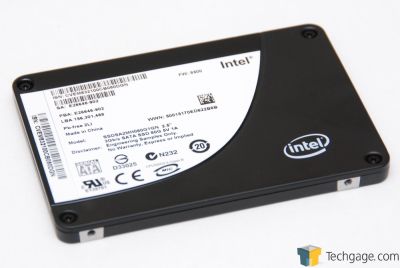From our front-page news:
Last Monday, we linked to an article posted by PC Perspective that took a look at the loss of performance on SSDs over time, with the target of focus being Intel's X25-M. The article went on to explain that during certain usage scenarios, the sub-block level can become highly fragmented and cause extreme slow-down over time. The worst of it is that typical defragging applications, such as Diskeeper, are unable to work on the sub-block level, and as a result, attempting to defrag the drives will make the issues only worse.
Since that article was posted, it's been getting a great deal of attention around the web, and as you might expect, Intel has been paying close attention to the issue. In a response to an editor at CNET, Intel notes that they've been unable to replicate the issue thus far, but they are of course still investigating the issue. Intel is also quoted as saying, "In our estimation, the synthetic workloads they use to stress the drive are not reflective of real world use."
I have no doubts that last point is true, but as mentioned in the originating article, the idea to investigate the issue began when the writer noticed performance degradation after a few months of regular desktop use. Intel also goes on to mention that it's typical to experience slowdown when the drive is full, and on an 80GB model, that's not hard to pull off. Whether or not that factor played a role in this, we're unsure, but I'm confident we'll be hearing from either Intel or PC Perspective with updates soon.
In response, Intel made a statement on Thursday. "Our labs currently have not been able to duplicate these results," Intel said. "In our estimation, the synthetic workloads they use to stress the drive are not reflective of real world use. Similarly, the benchmarks they used to evaluate performance do not represent what a PC user experiences."
<table border="0" width="100%"><tbody><tr><td>Source: Nanotech: The Circuits Blog</td> <td>
</td></tr></tbody></table>
Since that article was posted, it's been getting a great deal of attention around the web, and as you might expect, Intel has been paying close attention to the issue. In a response to an editor at CNET, Intel notes that they've been unable to replicate the issue thus far, but they are of course still investigating the issue. Intel is also quoted as saying, "In our estimation, the synthetic workloads they use to stress the drive are not reflective of real world use."
I have no doubts that last point is true, but as mentioned in the originating article, the idea to investigate the issue began when the writer noticed performance degradation after a few months of regular desktop use. Intel also goes on to mention that it's typical to experience slowdown when the drive is full, and on an 80GB model, that's not hard to pull off. Whether or not that factor played a role in this, we're unsure, but I'm confident we'll be hearing from either Intel or PC Perspective with updates soon.
In response, Intel made a statement on Thursday. "Our labs currently have not been able to duplicate these results," Intel said. "In our estimation, the synthetic workloads they use to stress the drive are not reflective of real world use. Similarly, the benchmarks they used to evaluate performance do not represent what a PC user experiences."
<table border="0" width="100%"><tbody><tr><td>Source: Nanotech: The Circuits Blog</td> <td>
</td></tr></tbody></table>

